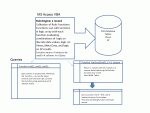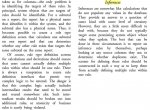Rx_
Nothing In Moderation
- Local time
- Today, 08:31
- Joined
- Oct 22, 2009
- Messages
- 2,803
Can anyone suggest other efficiencies?
Trying to run a query where each 4 fields calling a custom function will not just re-run the same custom function over and over again for each field in a single record.
A Function has a huge amount of multiple queries and logic to perform.
The Function returns a Integer, Integer, Integer, and optional Integer.
Each integer requires a DLookup to lookup a String description value for each individual integer (in each of 4 fields).
The problem is, the DLookup in each column that runs against each of the integers re-run the same function.
The result is that a single record, each of the 4 columns returning a single of the 4 values, the complex function is re-run 4 times.
The function is huge, part of a Business Rules Engine. Depending on the Rule-Meta data - it might launch up to a dozen queries and perform logic steps for each record. This is not the ordinary SQL Query.
Imagine if one record (for 1 field) takes 0.1 second to run. By referencing the function in 4 columns, this same function is re-run 4 times (0.4 Seconds) Against 50,000 records - this duplication of re-running the function for each column can really add up.
Possible Solutions:
Researched Class Modules - There is a comment that the property Get, Let actually reduce performance. There are huge advantage of code documentation, documentation and centralization.
It doesn't claim class modules reduce execution as each propery is returned. It also describes that Class Modules can't be called directly in a Query - unless each property is wrapped in a function.
Function Returns one String with delimiters: e.g 34;54;55;1
This single column goes into a Make Table (runs function one time per record) Then the D-Lookup is run against static local data. This pevented the function from being run over and over across the network linked data.
Final Solution:
Eventually, the many hundred lines of VBA code for the Rules Engine will be converted into SQL Server T-SQL Functions on the server.
For a Rule Engine development, Access has been great for a rapid protoype development and testing. The TSQL will be a final big step requiring re-coding. It is not currenty my option for the delivery time frame.
Trying to run a query where each 4 fields calling a custom function will not just re-run the same custom function over and over again for each field in a single record.
A Function has a huge amount of multiple queries and logic to perform.
The Function returns a Integer, Integer, Integer, and optional Integer.
Each integer requires a DLookup to lookup a String description value for each individual integer (in each of 4 fields).
The problem is, the DLookup in each column that runs against each of the integers re-run the same function.
The result is that a single record, each of the 4 columns returning a single of the 4 values, the complex function is re-run 4 times.
The function is huge, part of a Business Rules Engine. Depending on the Rule-Meta data - it might launch up to a dozen queries and perform logic steps for each record. This is not the ordinary SQL Query.
Imagine if one record (for 1 field) takes 0.1 second to run. By referencing the function in 4 columns, this same function is re-run 4 times (0.4 Seconds) Against 50,000 records - this duplication of re-running the function for each column can really add up.
Possible Solutions:
Researched Class Modules - There is a comment that the property Get, Let actually reduce performance. There are huge advantage of code documentation, documentation and centralization.
It doesn't claim class modules reduce execution as each propery is returned. It also describes that Class Modules can't be called directly in a Query - unless each property is wrapped in a function.
Function Returns one String with delimiters: e.g 34;54;55;1
This single column goes into a Make Table (runs function one time per record) Then the D-Lookup is run against static local data. This pevented the function from being run over and over across the network linked data.
Final Solution:
Eventually, the many hundred lines of VBA code for the Rules Engine will be converted into SQL Server T-SQL Functions on the server.
For a Rule Engine development, Access has been great for a rapid protoype development and testing. The TSQL will be a final big step requiring re-coding. It is not currenty my option for the delivery time frame.


